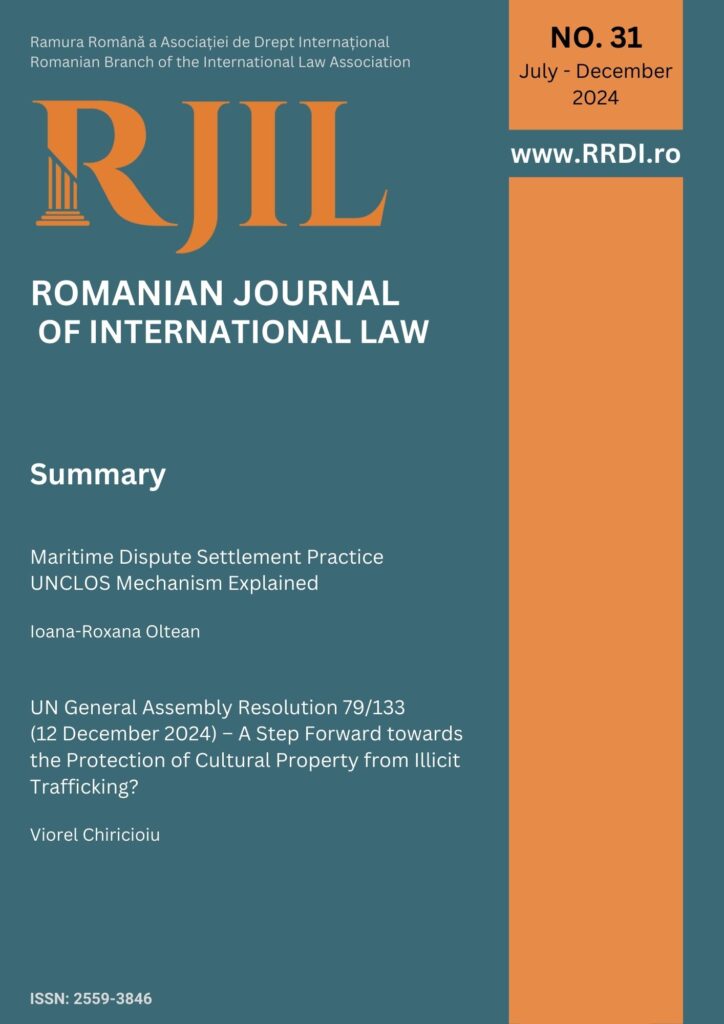Maritime Dispute Settlement Practice – UNCLOS Mechanism Explained
Ioana-Roxana OLTEAN
Maritime dispute resolution has always proven to be a volatile field of international law. This article will examine the mechanism of solving disputes as set up by UNCLOS and will look at the tendencies or particularities resulting from the cases of states involved in such matters. Despite its initial promise, the use of these mechanisms has been limited, with many states opting for informal negotiations or avoiding adjudication altogether. The article explores the structural aspects of UNCLOS’s dispute resolution system, highlighting challenges such as “forum shopping” and the reluctance of powerful states to comply with adverse rulings. It concludes by discussing the future viability of the UNCLOS dispute resolution system, raising concerns over the increasing resistance of major powers to international legal processes, and the potential long-term impact on global maritime governance.
UN General Assembly Resolution 79/133 (12 December 2024) – A Step Forward towards the Protection of Cultural Property from Illicit Trafficking?
Viorel CHIRICIOIU
On 6 December 2024, the General Assembly of the United Nations adopted, without a vote, Resolution 79/133, dealing with the pressing issues of return and restitution of cultural property items unlawfully removed from their countries of origin. This Resolution, though not legally binding, stands to prove the reaffirmation of fundamental principles and rules in this field by the international community of States, showing, in our view, a firm commitment to these values as already enshrined in international treaties and conventions. This article seeks to briefly comment the Resolution and its most important provisions, as well as whether the legal effects thereof have any actual practical efficiency.
The Principle of Distinction at the Crossroad ofArmed Conflict and Natural Disasters*
Filip A. LARIU
This article examines the challenges and limits of the principle of distinction in regard to the instrumentalization of natural disasters in armed conflict. While IHL requires parties to a conflict to distinguish between civilians and combatants, as well as between civilian and military objects, the disruption caused by natural disasters complicates this fundamental obligation. Existing scholarship has analyzed distinction in conventional warfare, but its application in disaster-affected conflicts remains underexplored. This study employs a legal doctrinal approach, assessing primary IHL sources to determine whether the exploitation of disaster effects constitutes a breach of distinction. The findings reveal two potential theories – one states that such instrumentalization inherently violates IHL, while the second advocates for a case-by-case analysis focused strictly on human action. The study underscores the need for heightened scrutiny in targeting decisions within disaster zones. By addressing this issue, this article contributes to the ongoing discourse on adapting IHL to contemporary challenges and ensuring the continued protection of civilians in conflict settings.
Functional Immunity in Relation to Crimes Pursuant to International Law
Raluca-Ioana ABABEI
This paper examines whether functional immunity applies to crimes pursuant to international law, addressing whether State officials can evade responsibility for international crimes by resorting to immunity ratione materiae. The topic is significant as it explores the balance between State sovereignty and individual accountability for international crimes. The research builds on foundational concepts of State sovereignty, the Nuremberg Principles, and decisions in landmark cases such as Pinochet. It relates to contemporary discussions by the International Law Commission and various domestic and international court rulings that challenge the traditional scope of functional immunity. The findings demonstrate that functional immunity does not apply to crimes pursuant to international law. Courts consistently rule that such crimes, due to their gravity and the involvement of State authority, override immunity claims. Universal jurisdiction and the peremptory nature of jus cogens norms further undermine functional immunity in these cases.
The Legitimacy Dilemma in Government Recognition
Andreea VOVEC
Government recognition in international law is a complex and evolving issue, shaped by legal principles and political realities. This paper examines the key criteria for recognition, including constitutionality, effective control, democratic legitimacy and international recognition, while highlighting their inconsistencies in State practice. By analyzing diverse doctrinal theories, together with the practice of States, a comprehensive overview of recognition frameworks is provided. Comparative case studies of contested governments illustrate the interaction between law and politics in determining legitimacy. The paper offers valuable insights for legal scholars, policymakers, and international organizations navigating the complexities of diplomatic recognition and State legitimacy.
Rising Tides, Shifting Boundaries: The Legal Implications of Sea-Level Rise and the Freezing of Maritime Baselines
Denisa-Ioana-Maria GUDINĂ
This paper examines the legal and geopolitical implications of rising sea levels, particularly in relation to maritime boundaries and the concept of freezing baselines under international law. Building upon climate science, international legal principles, and case law, this paper synthesizes findings from the Intergovernmental Panel on Climate Change (IPCC), United Nations Convention on the Law of the Sea (UNCLOS), and key international legal precedents. A multidisciplinary legal analysis is employed, incorporating treaty interpretation, state practice, and judicial decisions to assess the viability of fixed maritime baselines. The study finds that while UNCLOS does not explicitly mandate ambulatory baselines, principles such as legal stability and state practice provide a legal basis for fixed baselines. However, counter arguments exist, particularly regarding the dynamic nature of coastlines and maritime zones. The evolving legal landscape requires international cooperation to reconcile legal certainty with environmental realities. The potential codification of fixed baselines, recognition of climate-induced statelessness, and the role of equity in maritime delimitation are explored as future pathways. This paper contributes to the growing discourse on climate change and international law by evaluating the legal justifications for freezing baselines and their potential to shape emerging customary law.

